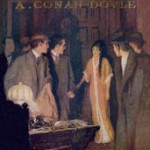“Come in this way,” said McPherson, who had evidently paid many a visit there before. Pushing open a swinging door, he made his way into the crowded bar, where the reek of bad spirits and the smell of squalid humanity seemed to Tom to be even more horrible than the effluvium of the grease-laden hold.
“Captain Miggs in?” asked McPherson of a rubicund, white-aproned personage behind the bar.
“Yes, sir. He’s in his room, sir, and expectin’ you. There’s a gent with him, sir, but he told me to send you up. This way, sir.”
They were pushing their way through the crowd to reach the door which led behind the bar, when Tom’s attention was arrested by the conversation of a very seedy-looking individual who was leaning with his elbows upon the zinc-covered counter.
“You take my tip,” he said to an elderly man beside him. “You stick to the beer. The sperits in here is clean poison, and it’s a sin and a shame as they should be let sell such stuff to Christian men. See here—see my sleeve!” He showed the threadbare cuff of his coat, which was corroded away in one part, as by a powerful acid. “I give ye my word I done that by wiping my lips wi’ it two or three times after drinkin’ at this bar. That was afore I found out that the whisky was solid vitriol. If thread and cotton can’t stand it, how’s the linin’ of a poor cove’s stomach, I’d like to know?”
“I wonder,” thought Tom to himself, “if one of these poor devils goes home and murders his wife, who ought to be hung for it? Is it he, or that smug-faced villain behind the bar, who, for the sake of the gain of a few greasy coppers, gives him the poison that maddens him?” He was still pondering over this knotty point when they were ushered into the captain’s room.
That worthy was leaning back in a rocking-chair with his feet perched upon the mantelpiece and a large glass of rum arid water within reach of his great leathery hand. Opposite him, in a similar chair and with a similar glass, was no less an individual than our old acquaintance, Von Baumser. As a mercantile clerk in the London office of a Hamburg firm the German was thrown into contact with the shippers of the African fleet, and had contracted a special alliance with the bibulous Miggs, who was a social soul in his hours of relaxation.
“Come in, my hearties, come in!” he cried huskily. “Take a seat, Mr.
Dimsdale. And you, Sandy, can’t you bring yourself to your berth
without being asked? You should know your moorings by this time.
This is my friend, Mr. Von Baumser from Eckermann’s office.”
“And dis, I think, is Mr. Dimsdale,” said the German, shaking hands with Tom. “I have heard my very goot vriend, Major Clutterbuck, speak of your name, sir.”
“Ah, the old major,” Tom answered. “Of course, I remember him well.”
“He is not so very old either,” said Von Baumser, in a somewhat surly voice. “He has been took by a very charming and entirely pleasant woman, and they are about to be married before three months, the one to the other. Let me tell you, sir, I, who have lived with him so long, dat I have met no man for whom I have greater respect than for the major, however much they give him pills at a club or other such snobberies.”
“Fill your glasses,” Miggs broke in, pushing over the bottle of rum. “There are weeds in that box—never paid duty, either the one or the other. By the Lord, Sandy, a couple of days ago we hardly hoped ever to be yarning here.”
“It was rather beyond our prognostication, sir,” said the mate, taking a pull at his rum.
“It was that! A nasty sea on, Mr. Dimsdale, sir, and the old ship so full o’ water that she could not rise to it. They were making a clean breach over us, and we lost nigh everything we could lose.”
“I suppose you’ll have her thoroughly repaired now?” Tom remarked.
Both the skipper and the mate laughed heartily at the observation.
“That wouldn’t do, Sandy, would it?” said Miggs, shaking his head.
“We couldn’t afford to have our screw cut down like that.”
“Cut down! You don’t mean to say you are paid in proportion to the rottenness of the ships?”
“There ain’t no use makin’ a secret of it among friends,” said Miggs. “That’s just how the land lies with us. A voyage or two back I spoke to Mr. Girdlestone, and I says to him, says I, ‘Give the ship an overhauling,’ says I. ‘Well and good,’ says he, ‘but it will mean so much off your wage,’ says he, ‘and the mate’s wage as well.’ I put it to him straight and strong, but he stuck at that. So Sandy and me, we put our heads together, and we ‘greed It was better to take fifteen pound and the risk, than come down to twelve pound and safety.”
“It is scandalous!” cried Tom Dimsdale hotly. “I could not have believed it.”
“God bless ye! it’s done every day, and will be while there is insurance money to be gained,” said Miggs, blowing a blue cloud up to the ceiling. “It’s an easy thing to turn a few thousands a year while there are old ships to be bought, and offices which will insure them above their value. There was D’Arcy Campbell, of the Silvertown—what a trade that man did! He was smart—tarnation smart! Collisions was his line, and he worked ’em well. There warn’t a skipper out of Liverpool as could get run down as nat’ral as he could.”
“Get run down?”


